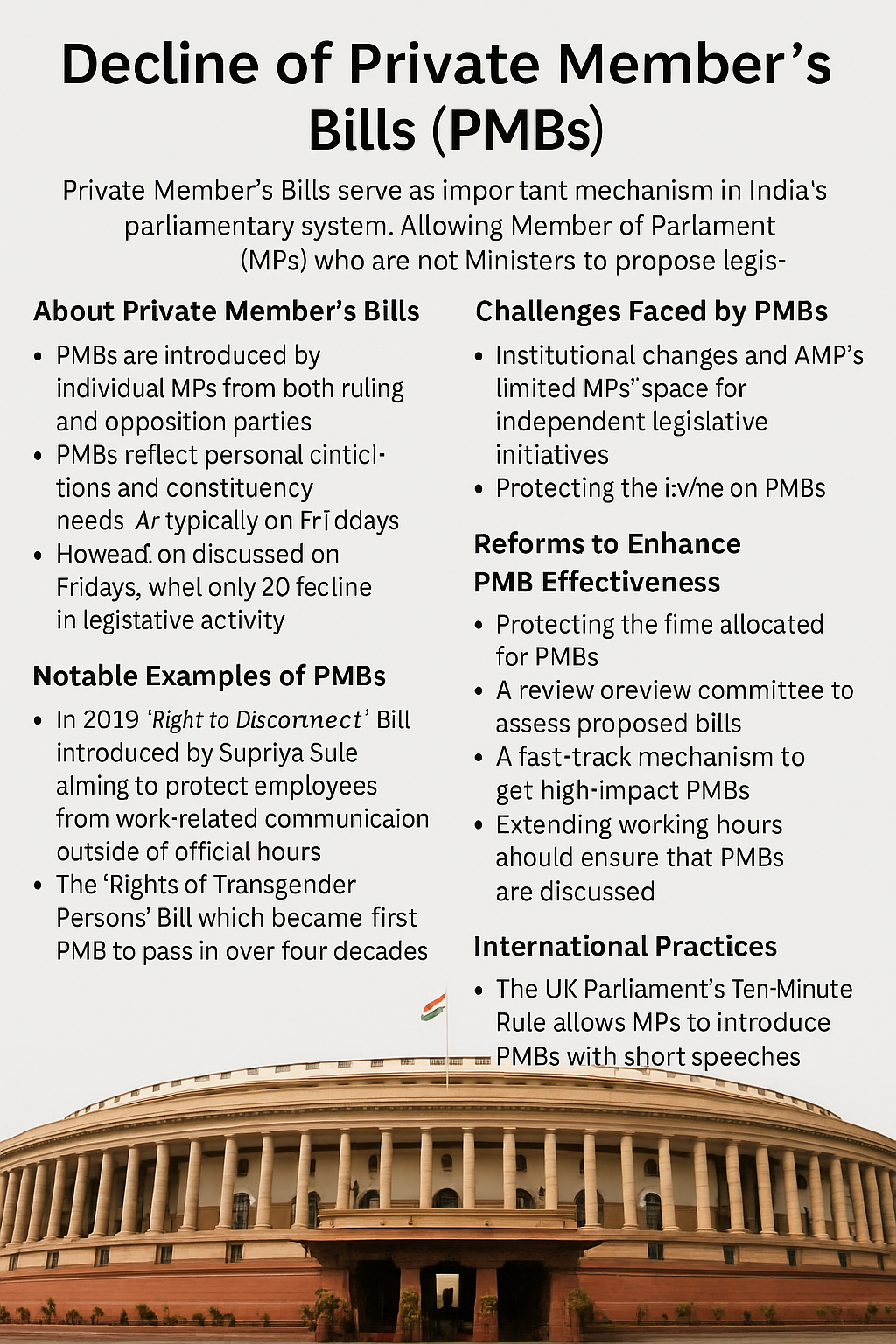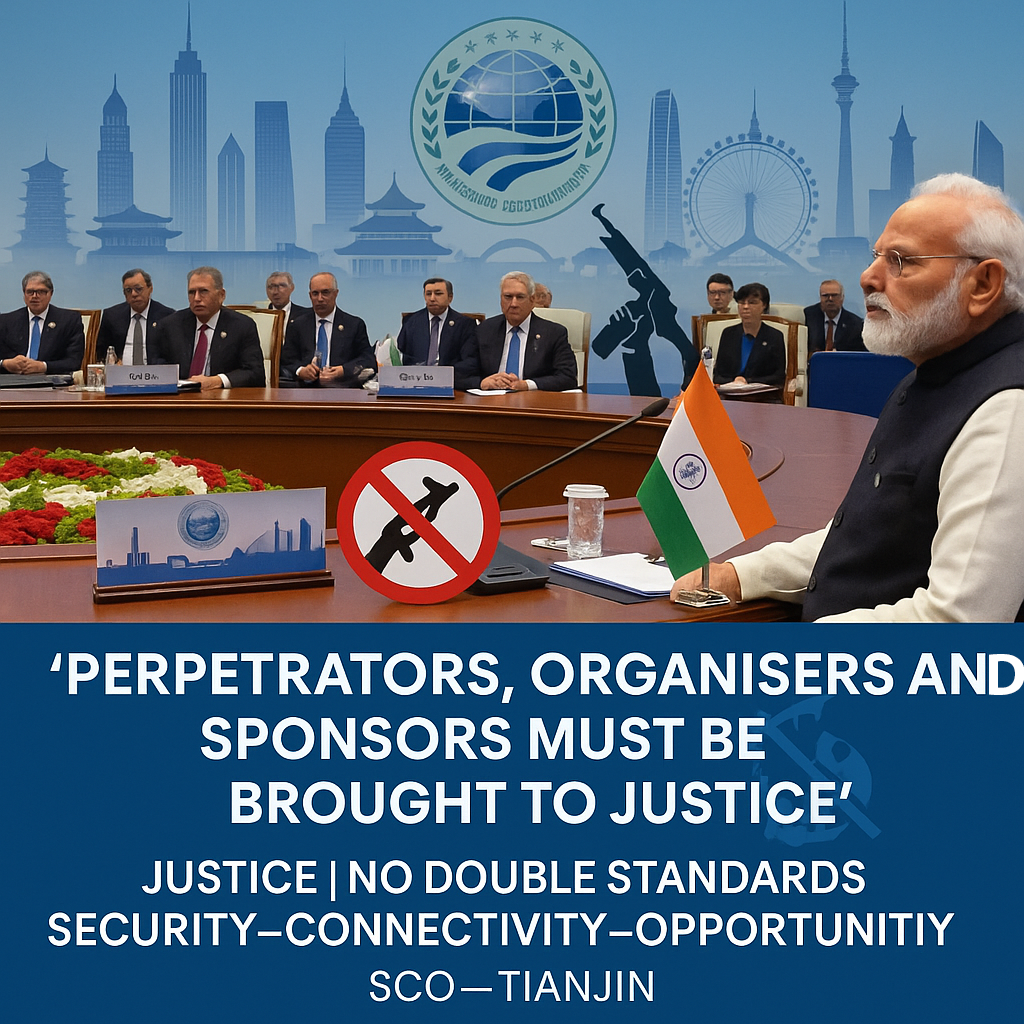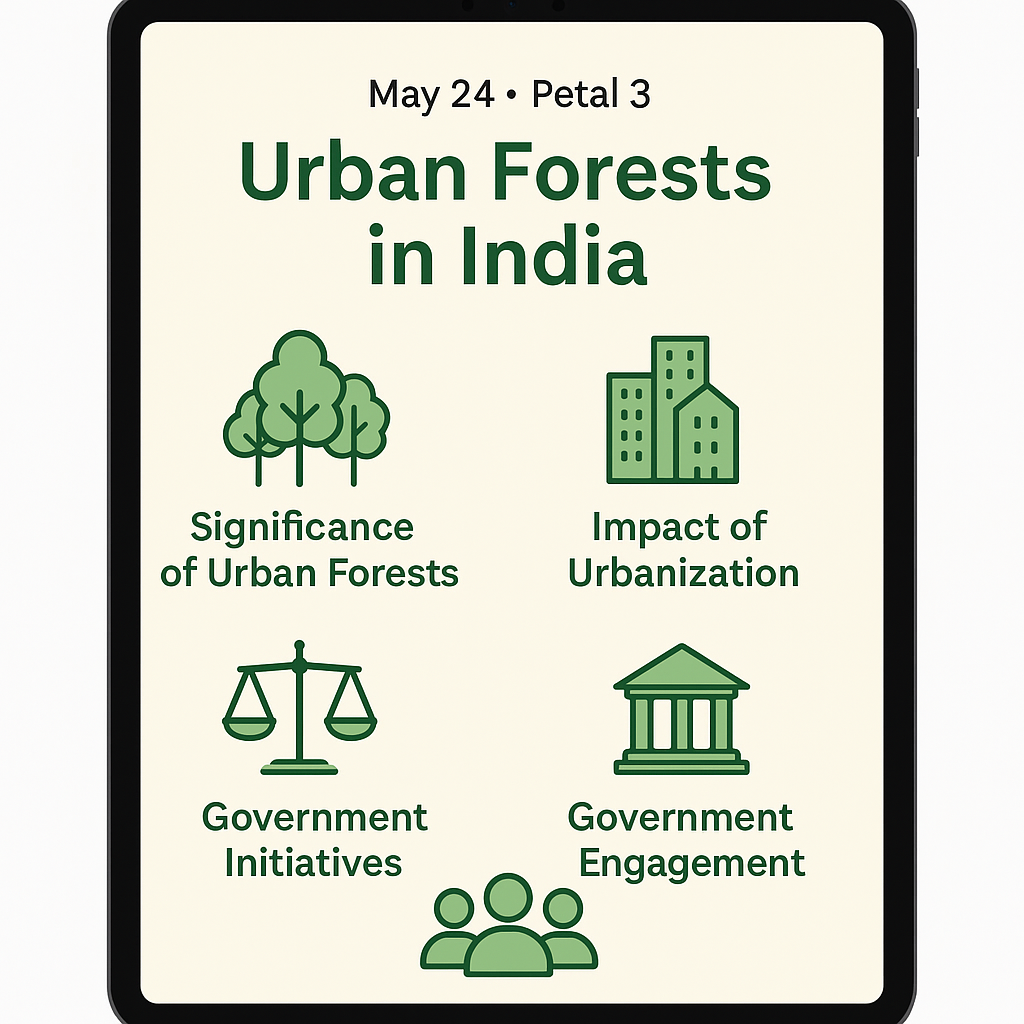
📅 May 3, 2025, Post 4: The Fading Voice of the Commons: The Decline of Private Member’s Bills in India |Mains Essay Attached | Target IAS-26 MCQs Attached: A complete Package, Dear Aspirants!
The Fading Voice of the Commons: The Decline of Private Member’s Bills in India

NATIONAL HERO — PETAL 004
🗓️ May 2, 2025
Thematic Focus: Parliamentary Reforms | Democracy | GS Paper 2 – Indian Polity
🕊️ Intro Whisper
A vibrant democracy does not speak only through governments—it murmurs through the convictions of its Members. Yet, in the echoing chambers of India’s Parliament, the voice of Private Members is growing faint.
🔍 Key Highlights
- What are Private Member’s Bills (PMBs)?
These are legislative proposals introduced by MPs who are not ministers. They reflect personal beliefs, regional needs, and policy alternatives beyond party mandates. Traditionally taken up on Fridays, PMBs embody participatory lawmaking. - Current Status:
- In the 17th Lok Sabha, 729 PMBs were introduced; only 16 were discussed.
- In the 18th Lok Sabha, merely 20 MPs have introduced PMBs so far.
This signals a worrying decline in legislative diversity and depth.
- Notable Examples:
- Right to Disconnect Bill (Supriya Sule, 2019): Aimed at reducing post-work digital stress. Though not passed, it sparked national discussion.
- Rights of Transgender Persons Bill: The first PMB passed in over 40 years.
- Challenges:
- Disruptions and frequent adjournments on Fridays dilute PMB debates.
- Anti-Defection Law restricts MPs’ freedom to deviate from party lines.
- Lack of dedicated mechanisms to filter, prioritize, and fast-track quality PMBs.
- Need for Reform:
- Allocate protected, uninterrupted time slots.
- Establish a PMB Review Committee.
- Introduce a fast-track route for high-impact bills.
- Learn from the UK’s Ten-Minute Rule to allow short pitches for new ideas.
🧭 GS Paper Mapping
- GS Paper 2: Parliament & State Legislatures – Structure, Functioning, Conduct of Business
- Keywords: Private Member’s Bills, Anti-Defection, Parliamentary Reforms, Democratic Institutions, Ten-Minute Rule
✨ A Thought Spark — by IAS Monk
When a government legislates, it commands.
When a private member legislates, it converses.
And it is in these small democratic conversations that the Republic breathes.
High Quality Mains Essay For Practice :
Word Limit 1000-1200
Reviving the Silent Reform: The Role and Decline of Private Member’s Bills in India’s Parliamentary Democracy
In a thriving democracy, legislative participation is not the prerogative of the ruling executive alone. It is the collective responsibility of every representative chosen by the people. Private Member’s Bills (PMBs), introduced by Members of Parliament (MPs) who are not ministers, have historically provided a vital democratic channel for alternative policy ideas, constituency demands, and progressive reforms. Yet, over time, the voice of these Bills has grown dim in India’s parliamentary halls. With fewer MPs participating, diminishing debate slots, and a poor record of passage, PMBs are increasingly seen as symbolic gestures rather than substantial contributions to nation-building. This essay delves into the significance of PMBs, the trends behind their decline, and the risks this poses to the democratic architecture of India.
The Role and Significance of Private Member’s Bills
The Constitution of India and the Rules of Procedure of Parliament allow any MP, other than a minister, to introduce a Bill. These PMBs provide a forum for individual legislators—whether from the ruling or opposition parties—to suggest laws based on regional, ideological, or humanitarian concerns. They serve several critical functions:
- Policy Innovation and Democratic Pluralism
PMBs allow fresh ideas to enter the legislative domain. They challenge the dominance of the executive in law-making and enrich policy discourse. From social justice issues to digital rights and labor reforms, PMBs have often been ahead of their time. - Constituency Representation and Issue Articulation
MPs can raise issues specific to their constituencies, especially those that don’t find space in the government’s legislative priorities. This bottom-up flow of legislative input strengthens the connection between the people and the lawmaking process. - Legislative Training Ground
For first-time or young MPs, drafting and defending a PMB is an essential part of learning the legislative process. It sharpens their understanding of policy, improves their oratory, and encourages bipartisan engagement. - Symbol of Institutional Democracy
Most importantly, PMBs stand as a testament to Parliament’s character as a deliberative body rather than a rubber stamp. Even when not passed, their discussion fosters a culture of accountability and openness.
Notable Milestones and Missed Opportunities
Although rare, some PMBs have shaped India’s social and legal landscape. The most cited example is The Rights of Transgender Persons Bill, which passed in the Rajya Sabha in 2015—becoming the first PMB to clear a House in over four decades. It sparked nationwide dialogue and eventually contributed to the government’s own Transgender Persons Act in 2019.
Similarly, Supriya Sule’s Right to Disconnect Bill (2019) aimed to secure work-life balance in the digital age. Though not passed, it catalyzed public conversation on mental health, labor rights, and digital etiquette.
Other influential PMBs in the past have addressed climate change, education reform, election transparency, and labor rights. Each one, regardless of its legislative fate, contributed to evolving political imagination.
The Decline: A Troubling Democratic Deficit
Despite their relevance, PMBs have experienced a steep decline in seriousness and support:
- In the 17th Lok Sabha, 729 PMBs were introduced, but only 16 were discussed.
- In the 18th Lok Sabha (ongoing), only 20 MPs have introduced PMBs so far.
This dramatic drop is the result of multiple systemic and institutional challenges:
- Executive Dominance and Time Constraints
Parliamentary sessions are often consumed by government business, leaving little or no time for private legislative proposals. Fridays—the only day reserved for PMBs—are often lost to disruptions or adjournments. - Anti-Defection Law and Party Discipline
The 10th Schedule of the Constitution disincentivizes MPs from pursuing independent legislative paths. Even within ruling coalitions, PMBs by backbenchers are discouraged unless pre-cleared by party leadership. - Absence of Institutional Incentives
There is no formal mechanism to vet, prioritize, or fast-track important PMBs. This results in backlogs, limited debate, and zero impact—discouraging MPs from investing time in such proposals. - Public and Media Apathy
PMBs rarely receive serious media coverage or public attention. With little political capital to gain, MPs naturally gravitate toward other avenues to showcase impact.
Consequences of the Decline
The fall of PMBs has consequences that go beyond parliamentary calendars:
- Democratic Disempowerment of MPs
Legislators become passive participants in governance, eroding the representative ideal of the parliamentary system. - Reduced Policy Diversity
The legislative agenda becomes monopolized by the executive. Critical, transformative ideas—such as those around digital labor, environmental justice, gender inclusion, or decentralization—may never see light if the government does not initiate them. - Institutional Atrophy
Parliament’s character as a debating and deliberating institution gets diluted. A legislature that only endorses executive will risks becoming a procedural formality.
Lessons from Abroad
India can draw from global best practices. In the UK, the Ten-Minute Rule allows MPs to introduce PMBs through short speeches, even during regular hours. Although most such Bills don’t become law, many influence future policy or become the basis for government legislation.
In Canada, PMBs are allotted a fixed number of hours every week, with formal procedures to ensure voting on select Bills. This ensures that MPs feel their legislative initiatives are not symbolic gestures but have a procedural chance of success.
What Can Be Done?
A revival of PMBs requires bold yet practical reforms:
- Institutional Safeguards: Protect the Friday slot or provide additional time in each session for PMB discussion.
- PMB Review Committee: Set up a bipartisan group to screen, prioritize, and fast-track select PMBs.
- Automatic Listing and Voting: Ensure that PMBs with wide support are not merely introduced but mandatorily debated and voted upon.
- Public Awareness Campaigns: Encourage civil society and media to highlight PMBs of public interest, thereby creating external pressure.
Conclusion
The spirit of democracy lies not only in the will of the government but also in the quiet courage of individual Members of Parliament. PMBs, when nurtured with sincerity and procedural support, act as engines of social transformation, political education, and participatory law-making. Their decline is not just a procedural issue—it’s a philosophical warning. If Parliament becomes only an echo of the Cabinet, we lose the very spirit that gave us our Constitution.
“The strength of a Parliament lies not in the might of its majority, but in the depth of its debate.”
Target IAS-26: Daily MCQs: May 3, 2025
📌 Prelims Practice MCQs
Topic: the Decline of Private Member’s Bills (PMBs) in India:
MCQ 1: Type-1 — “How many of the above statements are correct?”
Q. Consider the following statements regarding Private Member’s Bills (PMBs) in India:
1. PMBs are introduced only by members from the Opposition.
2. The discussion of PMBs is typically scheduled for Fridays in the Parliament.
3. The ‘Right to Disconnect Bill’ and the ‘Rights of Transgender Persons Bill’ were notable PMBs.
4. PMBs once passed become automatically binding on the government to implement.
How many of the above statements are correct?
A) Only two
B) Only three
C) All four
D) Only one
🌀 Didn’t get it? Click here (▸) for the Correct Answer & Explanation
✅ Correct Answer: B) Only three
🧠 Explanation:
- Statement 1 is incorrect — PMBs can be introduced by any MP who is not a minister, regardless of party.
- Statement 2 is correct — Fridays are reserved for discussion of PMBs.
- Statement 3 is correct — Both bills were introduced as PMBs and were widely discussed.
- Statement 4 is incorrect — PMBs need to be passed by both Houses and assented to by the President to become law.
Hence, only statements 2, 3, and part of 4 are correct = Three correct.
MCQ 2: Type-4 — “Two Statements: Correct/Incorrect”
Q. Examine the following statements regarding legislative reform:
1. The Anti-Defection Law in India empowers MPs to freely vote on any Bill without party interference.
2. The 17th Lok Sabha saw over 700 PMBs introduced, but less than 20 of them were discussed in detail.
Which of the statements is/are correct?
A) Only 1 is correct
B) Only 2 is correct
C) Both 1 & 2 are correct
D) Neither 1 nor 2 is correct
🌀 Didn’t get it? Click here (▸) for the Correct Answer & Explanation
✅ Correct Answer: B) Only 2 is correct
🧠 Explanation:
- Statement 1 is incorrect — The Anti-Defection Law restricts MPs from voting independently against party lines.
- Statement 2 is correct — In the 17th Lok Sabha, 729 PMBs were introduced, but only 16 were discussed.
Hence, only Statement 2 is correct.


















